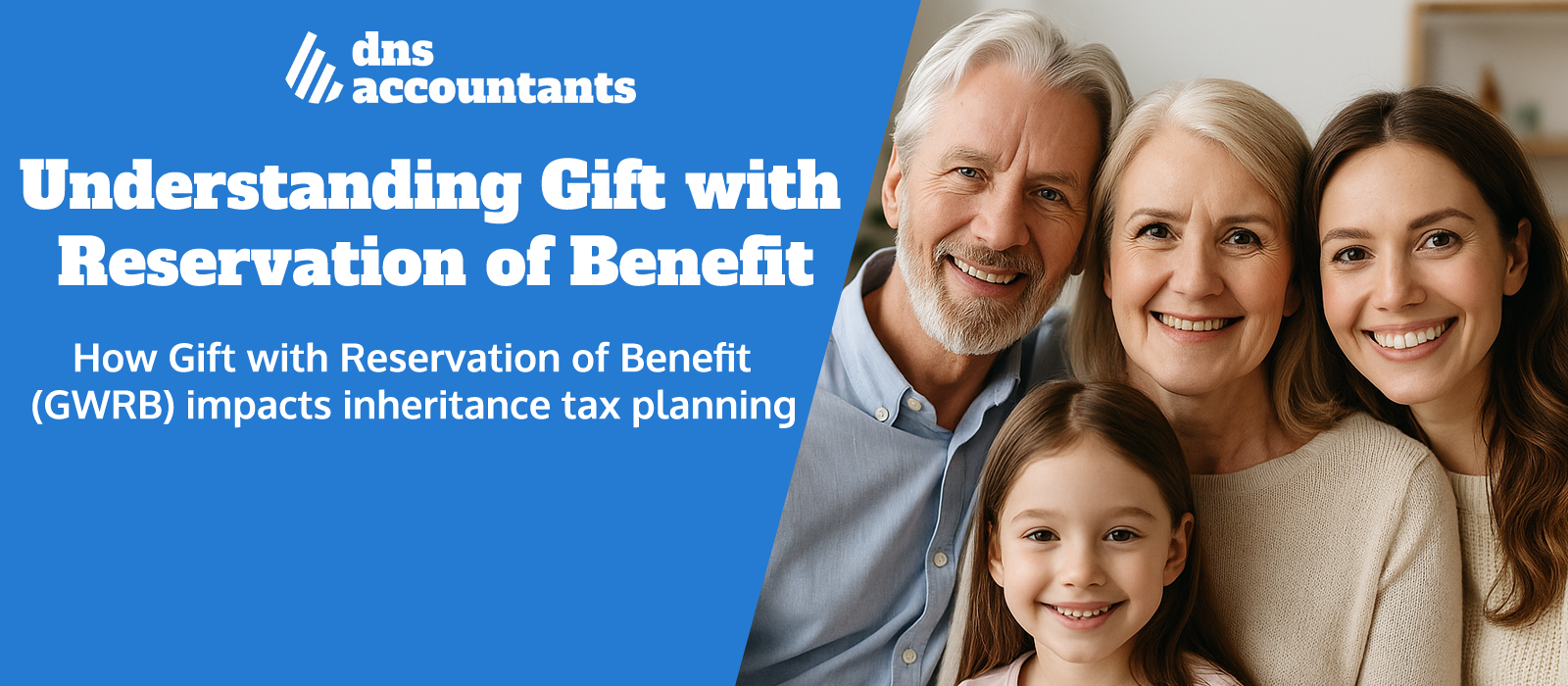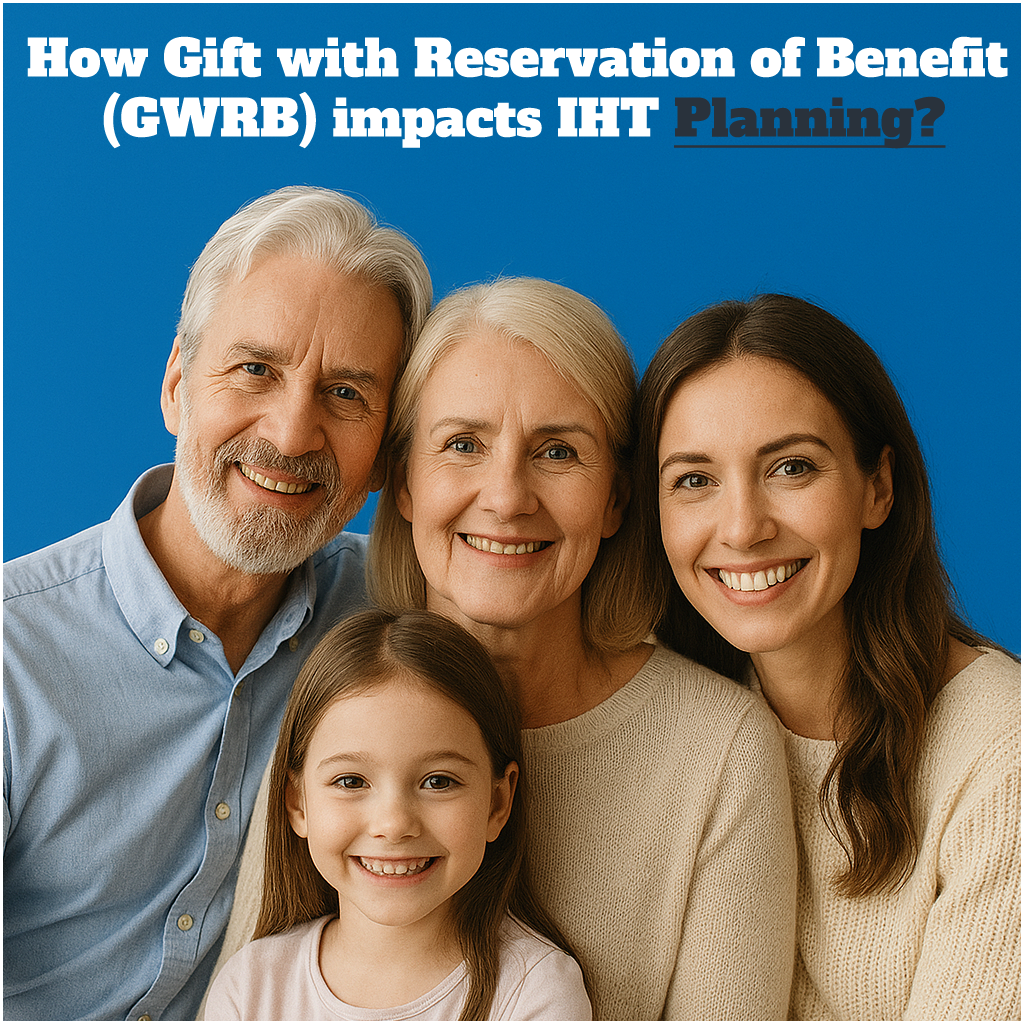
A gift with reservation of benefit (GWRB) is when you give away an asset but still keep some benefit from it. This can create problems for UK Inheritance Tax (IHT). This guide explains what a GWRB is, the tax implications, and how to plan to reduce the risk of unexpected tax charges.
Key points
- A GWRB is where you gift an asset but continue to benefit from it, meaning it can remain in your estate for Inheritance Tax purposes.
- If you keep any benefit, the gift generally won’t be treated as a Potentially Exempt Transfer (PET); to avoid this, you usually need to give up both control and benefit.
- Planning options (for example, paying full market rent where appropriate) and professional advice can help reduce the IHT risk.
What is a Gift with Reservation of Benefit?
A Gift with Reservation of Benefit is an estate planning situation where you give an asset away, but still enjoy some benefit from it.
This can trigger specific tax rules and complicate how the gift is treated for IHT.
Legally, ownership may pass to the recipient (the donee) on the date of the gift. However, if you retain a benefit, the asset can still be treated as part of your estate for IHT purposes.
What “reservation of benefit” means
A reservation of benefit happens when an asset is gifted but the donor continues to benefit from it. Common examples include continuing to live in a gifted home, or continuing to receive income from a gifted asset. These rules exist to stop people giving away assets “on paper” while still enjoying them in practice.
Examples of a GWRB
- Gifting a home but continuing to live there rent-free: for example, parents transfer their house to adult children but carry on living in it without paying a market rent.
- Gifting property but keeping the use of it: where the donor transfers the legal ownership but still enjoys the property’s use without paying a commercial rent.
These examples show why retaining any benefit can bring the asset back into scope for IHT.
Tax consequences of a GWRB
The tax impact of a GWRB can be significant. Where the donor retains benefits, the gifted asset can remain within the donor’s estate for IHT purposes, potentially leading to unexpected liabilities.
Inheritance Tax (IHT)
If the donor does not fully give up the benefit of an asset after gifting it, the asset can still be treated as part of the donor’s estate for IHT. In practical terms, that means the value may be taxed as if it had never been given away.
A common misunderstanding is that gifting an asset is enough on its own. If the donor dies within 7 years of making the gift, IHT may be relevant anyway. But with a GWRB, the issue is that the asset can remain in the estate regardless of the 7-year period if the benefit is retained.
Potentially Exempt Transfers (PETs)
A Potentially Exempt Transfer is a gift that can become exempt from IHT if the donor survives for 7 years, subject to the wider IHT rules.
However, a gift that is treated as a GWRB generally won’t qualify as a PET in the way people expect, because the donor has not truly given up the benefit.
In simple terms: to have a realistic chance of a gift being treated as effective for IHT planning, the donor typically needs to give up both ownership and benefit.
Double charges relief
In some cases, these rules can create a risk of a charge on the original gift and then again on death. Double charges relief is intended to prevent the same value being taxed twice, reducing the overall IHT burden where the conditions are met.
Avoiding a GWRB
Avoiding GWRB problems usually comes down to one principle: if you gift an asset, you must not continue to benefit from it.
Where that is difficult, careful planning is essential.
Paying market rent
One approach (particularly with property) is for the donor to pay full market rent to the new owner for continued occupation. To support this, you generally need a clear rental arrangement and evidence of regular payments at a market rate.
Full transfer of ownership (and benefit)
To reduce the risk of a gift being treated as a GWRB, the transfer needs to be genuine. That typically means the donor gives up control and stops benefiting from the asset.
Partial transfers and informal arrangements can create avoidable IHT exposure.
Legal and professional advice
GWRB rules are technical, and the consequences can be expensive. Professional advice can help you structure gifts correctly and avoid accidental non-compliance.
Planning your estate with GWRB in mind
If you’re making lifetime gifts as part of estate planning, it’s important to consider the GWRB rules early so gifts are structured properly and remain effective.
Gifting strategies
Timing and structure matter. If gifts are made well in advance, and the donor does not retain any benefit, they can reduce the value of the taxable estate.
Some people also use regular gifting patterns (for example, ongoing contributions) so long as the gifts are genuinely made without retained benefit and align with the relevant tax rules.
Monitoring and record-keeping
Good records make it easier to show what happened and why. If rent is being paid (for example, after gifting a property), keep supporting documents such as a tenancy agreement and bank records showing the payments.
Common mistakes (and how to avoid them)
Retaining benefits without realising
A frequent issue is continuing to use a gifted asset as if nothing has changed. Even where the legal ownership has been transferred, continued benefit can undermine the gift for IHT planning.
The practical fix is straightforward: ensure the donor does not retain any benefit after the gift is made.
Misunderstanding “market rent”
If the donor continues to live in a gifted property, paying a token amount (or paying rent inconsistently) can create problems.
If market rent is the chosen approach, it needs to be market value and properly evidenced.
Case studies of GWRB
Successful GWRB avoidance
Proper planning can avoid GWRB. For example, where a property is gifted but the former owner pays full market rent under a clear arrangement, the risk of the gift being treated as a GWRB is reduced.
Non-compliance and the tax impact
Where donors gift assets but continue to enjoy them rent-free (or without a genuine transfer of benefit), the asset can remain within the estate for IHT, creating significant liabilities.
Conclusion
Gifts with reservation of benefit can easily arise when someone gives away an asset but continues to use or benefit from it.
If you want gifts to be effective for IHT planning, structure them carefully, avoid retained benefits, and keep clear records.
If you’re unsure, get professional advice before making changes.
FAQs
What is a Gift with Reservation of Benefit (GWRB)?
A GWRB is where someone gives away an asset but keeps some benefit from it. This can bring the asset back into their estate for tax purposes and affect how it is treated for IHT.
How does GWRB affect Inheritance Tax?
If the donor keeps any benefit from the gifted asset, it can still be treated as part of their estate for IHT, which can increase the IHT liability on death.
What are Potentially Exempt Transfers (PETs) and how do they relate to GWRB?
PETs are gifts that can become exempt from IHT if the donor survives 7 years, subject to the IHT rules. If a gift is treated as a GWRB because the donor kept a benefit, it generally won’t work as a PET in the way many people expect.
How do I avoid a GWRB when gifting property?
Common approaches include ensuring the donor does not retain any benefit, transferring ownership properly, and (where the donor remains in occupation) paying full market rent under a clear arrangement. Professional advice is strongly recommended.
What common mistakes should I avoid with GWRB?
The main mistakes are retaining benefits unknowingly and misunderstanding what “market rent” means. Avoid both by keeping arrangements genuine and well documented.
